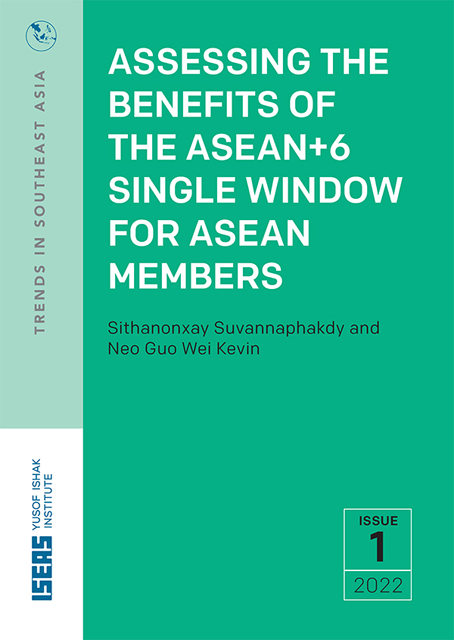Book contents
- Frontmatter
- Foreword
- Assessing the Benefits of the ASEAN+6 Single Window for ASEAN Members
- Assessing the Benefits of the ASEAN+6 Single Window for ASEAN Members
- Annex 1: Data on Trade Facilitation Measures
- Annex 2: Methodology for Estimating the Relationship between Trade Times and Crossborder Paperless Trade
- Annex 3: List of Countries Included in the Regression Model
- References
Assessing the Benefits of the ASEAN+6 Single Window for ASEAN Members
Published online by Cambridge University Press: 01 September 2023
- Frontmatter
- Foreword
- Assessing the Benefits of the ASEAN+6 Single Window for ASEAN Members
- Assessing the Benefits of the ASEAN+6 Single Window for ASEAN Members
- Annex 1: Data on Trade Facilitation Measures
- Annex 2: Methodology for Estimating the Relationship between Trade Times and Crossborder Paperless Trade
- Annex 3: List of Countries Included in the Regression Model
- References
Summary
Executive Summary
• The ASEAN+6 Single Window (ASW+6) in this study refers to the geographic expansion of the ASEAN Single Window (ASW) to enable cross-border electronic exchange of trade-related data and documents among ASEAN member states and six FTA partners, namely, Australia, China, India, Japan, New Zealand and South Korea. The ASW is part of ASEAN’s trade facilitation reform to reduce intraregional trade costs and time.
• This study considers cross-border paperless trade measures to represent the implementation of ASW+6, using data from the UN Global Survey on Digital and Sustainable Trade Facilitation in 2019. The simulation analyses reveal that the ASW+6 has significant potential to reduce times required to export and import, and to boost trade in ASEAN and its FTA partners.
• Partial implementation of cross-border paperless trade measures would imply an increase in ASEAN’s exports of US$102 billion annually. Under a more ambitious scenario of full implementation of cross-border paperless trade, the export gain for ASEAN would be US$199 billion annually. At the same time, the time required to export would fall by anything between 19 to 98 per cent, depending on the reform scenario considered.
• Trade gains from a full-fledged ASW+6 have not yet been reaped: even strong performers such as Singapore, Australia and New Zealand have areas for improvements, and weaker performers such as Cambodia and Laos need to make significant progress to catch up with the rest of the region, and deepen their mutual trade integration.
• The sequence of expanding the ASW to FTA partners may begin with countries that are major sources of ASEAN’s export gains identified in this study and those that have expressed their political will to move in that direction. These are Japan and South Korea. The ASW should then be enlarged to remaining FTA partners, especially China and India.
• While trade gains from ASW+6 are substantial, the implementation costs can also be significant due to different regulatory requirements across ASEAN+6 countries. Aid for trade and capacity-building to support the reform process have to be an integral part for the design of ASW+6.
- Type
- Chapter
- Information
- Publisher: ISEAS–Yusof Ishak InstituteFirst published in: 2023



